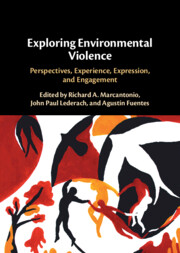Exploring Environmental Violence
The contributors to this book represent a wide breadth of scholarly approaches, including law, social and environmental science, and engineering, as well as from the arts and humanities. The chapters explore what environmental violence is and does, and the variety of ways in which it affects different communities. The authors draw on empirical data from countries and regions around the globe, including Ukraine, French Polynesia, Latin America, and the Arctic. The variety of responses to environmental violence by different communities, whether through active resistance or the creative arts, is also discussed, providing the foundation on which to build alternatives to the potentially damaging trajectory on which humans currently find themselves. This book is indispensable for researchers and policymakers in environmental policy and peacebuilding. This title is also available as Open Access on Cambridge Core.
Richard A. Marcantonio is an assistant professor at the Joan B. Kroc Institute at the University of Notre Dame focused on regenerative livelihoods, environmental management, environmental and other violence, and peacebuilding. He is the author of Environmental Violence: In the Earth System and the Human Niche (Cambridge University Press, 2022) and coauthor of the textbook Environmental Management: Concepts and Practical Skills (Cambridge University Press, 2022).
John Paul Lederach is a senior fellow at Humanity United and Professor Emeritus of International Peacebuilding at the Joan B. Kroc Institute at the University of Notre Dame. An active conciliation practitioner, he is the author of The Moral Imagination: The Art and Soul of Building Peace (Oxford University Press, 2005).
Agustín Fuentes is a professor of anthropology at Princeton University, researching human evolution, multispecies anthropology, sex/gender, and structures of race and racism. His books include Race, Monogamy, and Other Lies They Told You: Busting Myths about Human Nature (University of California Press, 2012), The Creative Spark: How Imagination Made Humans Exceptional (Dutton, 2017), and Why We Believe: Evolution and the Human Way of Being (Yale University Press, 2019).



